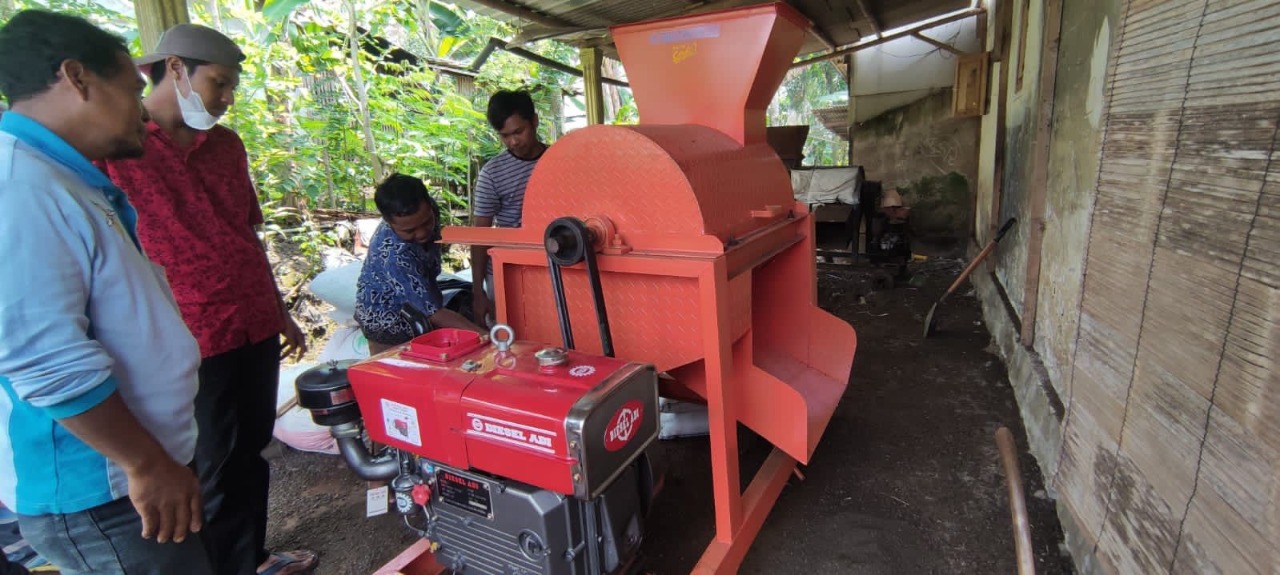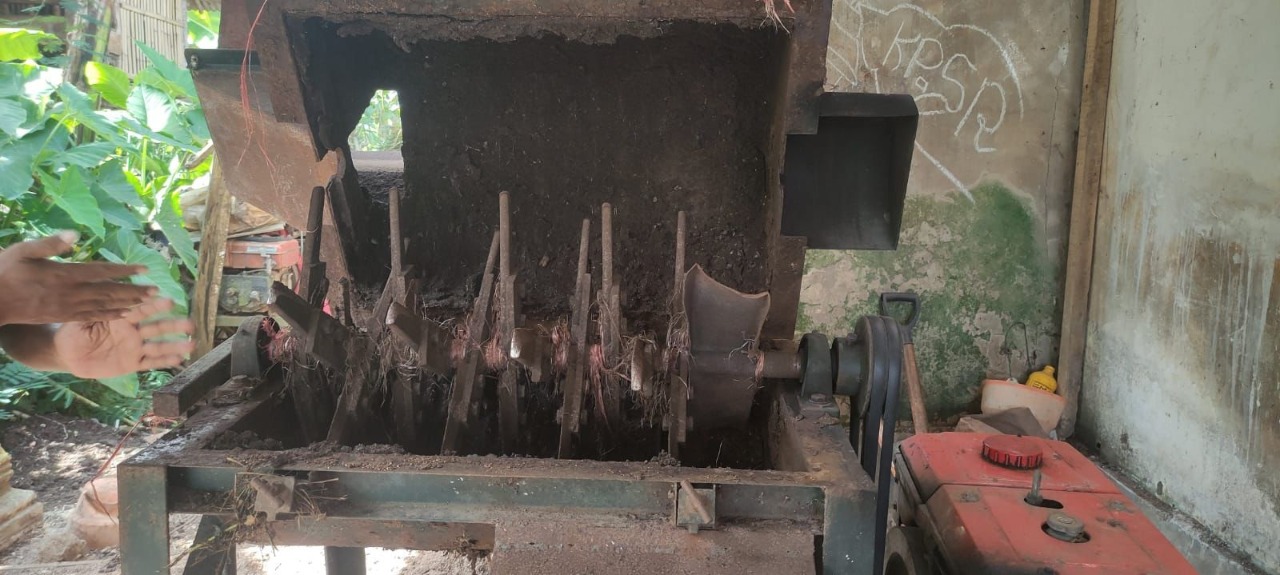The ITS KKN Team Innovation Machine Accelerates Manure Production

The trial process of the goat dung grinding machine with the Kenongo Village community, Gucialit District, Lumajang Regency
ITS Campus, ITS News – Institut Teknologi Sepuluh Nopember (ITS) students once again showed their service to the community. Through the Community Service Real Work Lecture (KKN Abmas) team, ITS students designed more innovative goat dung grinding machine to simplify making organic fertilizer.
This time the KKN Abmas activity took place in Kenongo Village, Gucialit District, Lumajang Regency. Involving the Karya Bakti II group as a farmer group in Kenongo Village, the manufacture of the goat dung grinding machine was initiated by a lecturer from the Instrumentation Engineering Department, ITS Vocational Faculty, Putri Yeni Aisyah ST MT, along with four students.
The four students involved were Tsurayya Alifia Zahrah, Adhista Widya Nandasari, Yanuari Rizqii Waahidah from the Statistics Department, and Leyli Lathifatul Azizah from the Mathematics Department. The four carried out the design process until they tested the grinding machine for six months since May 2021.
Adhista, one of the students involved in the program, explained that the Bakti Karya II farmer group has its goat dung grinding machine. However, the device owned by the farmer group has weaknesses, such as the crushing process, which takes a long time and is repeated several times to get a good grind.
Therefore, the ITS KKN team took the initiative to create a goat dung grinding machine that is more effective and efficient. Specifically, Adhista explained that the device carried by the ITS KKN team could destroy the geometry of the tough goat dung skin so that it can be used as fertilizer.
In addition, he continued, the machine is made with an angled shape like a hammer. The milling process is assumed to be like beating repeatedly. “Dried goat dung will then enter the roller grinder which rotates in the opposite direction and is taken to disposal,” said the alumnus of SMA Negeri 2 Lumajang.
In the process, Adhista said there were several stages they had executed. The first stage was in the form of a direct survey to Kenongo Village to meet the Karya Bakti II farmer group and discuss the existing problems. Then, proceed with the machine design process and the preparation of machine installation techniques. Finally, they carry out the installation or installation of the machine, accompanied by a trial process and evaluation of the performance of the tools made.
The student who likes dancing said that the manufacture of the grinding machine body resulted from a collaboration between the Measurement Laboratory of the ITS Instrumentation Engineering Department and a mechanical workshop. The process of making the goat dung grinding machine takes about two months. “After that, we handed over the tools to the Karya Bakti II farmer group,” said Adhista.
As described by members, the manufacture of this machine has received extraordinary interest from the local community. The Karya Bakti II farmer group gave a good response. It strongly supported the activities carried out by the ITS KKN team.
The goat dung mill produced by the machine designed by the ITS KKN team is easier to melt into the ground. In addition, this tool does not take long to process as expected.

The trial of the goat dung grinding machine designed by the ITS KKN Abmas team19
The great enthusiasm of the community made this activity run entirely without a hitch. As told by Adhista, the existence of social restrictions due to the soaring Covid-19 pandemic made coordination between partners and the ITS KKN team unable to be carried out directly.
“Finally, we communicated through the Zoom Meeting application, but thank God it went smoothly until the submission process while complying with health protocols,” he said.
In the end, Adhista wants this program to support the development of ITS science, technology, and art, especially in increasing the production and productivity of agricultural products through the use of organic fertilizers. In addition, it is hoped that it can help improve the community’s economy. The farmer groups that have been fostered can collaborate with ITS into an enabled group. (NA / ITS PR)
Reporter: Yanwa Evia Java
Related News
-
ITS Academic Staff Initiates Work Safety Revolution through Digital Technology
ITS Campus, ITS News — Based on existing report data, 17 kinds of accidents mostly occur due to the lack
March 22, 2022 19:03 -
ITS Collaboration with BPBD East Java, Launching VR Disaster Simulation
ITS Campus, ITS News — Supporting anticipation of disasters and continuing to educate the public, Institut Teknologi Sepuluh Nopember
March 22, 2022 19:03 -
Supporting the Implementation of Innovative Ideas, ITS and IYSA Hold International Competition
ITS Campus, ITS News — Institut Teknologi Sepuluh Nopember (ITS) has once again proven its commitment to supporting the
March 22, 2022 19:03 -
ITS Maintains Informative Qualification for Five Consecutive Years at KIP Awards
ITS Campus, ITS News — Institut Teknologi Sepuluh Nopember (ITS) has once again successfully maintained its Informative Qualification predicate
March 22, 2022 19:03
